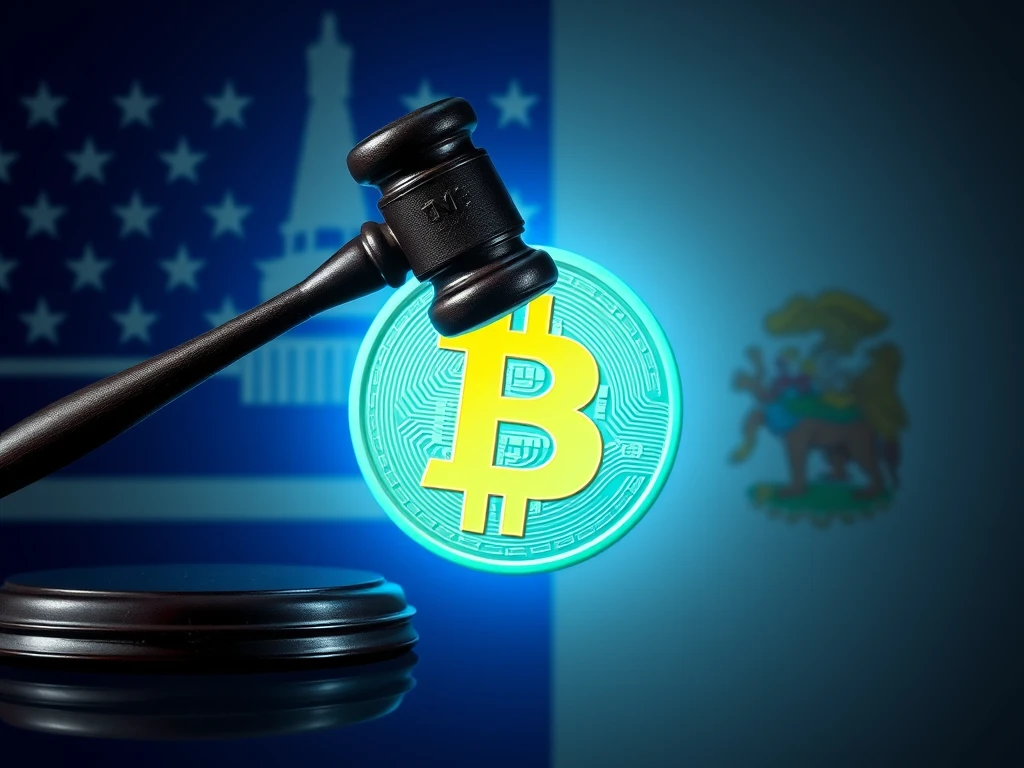Strategic Bitcoin Reserve Bills Advance in New Hampshire and Florida: A Game Changer?

Exciting developments are unfolding in the United States as New Hampshire and Florida take bold steps towards integrating Bitcoin into their state financial strategies. Are we witnessing a pivotal moment for state-level Bitcoin adoption? Let’s delve into the details of these groundbreaking Bitcoin reserve bills and what they could mean for the future of digital assets in state governance.
New Hampshire Leads the Charge in State Bitcoin Adoption
New Hampshire is now making headlines as the fourth US state to pass a Bitcoin reserve bill through a legislative chamber. House Bill 302 (HB302) successfully navigated the House with a 192-179 vote on April 10th and is now heading to the Senate. This move positions New Hampshire alongside Arizona, Texas, and Oklahoma in exploring Bitcoin as a state asset. What exactly does this bill propose?
- Investment in Digital Assets: HB302, if enacted, would empower the state treasurer to allocate up to 10% of New Hampshire’s general fund and other designated funds into precious metals and specific digital assets.
- Bitcoin Focus: The bill strategically targets cryptocurrencies with a market capitalization exceeding $500 billion, a criterion currently met exclusively by Bitcoin. This clearly signals a strong interest in establishing a Bitcoin reserve bill.
- Custody Framework: HB302 also outlines the necessary protocols for the secure custody of these digital assets, addressing a crucial aspect of managing state-owned cryptocurrency.
However, not everyone is on board. During the House debate, Democrat Representative Terry Spahr raised concerns about the bill’s necessity and potential risks to the state’s digital asset security. Spahr argued that the state treasurer already possesses the authority to invest in such assets and cautioned against locking in specific security measures in the rapidly evolving crypto landscape.
Republican Representative Jordan Ulery, on the other hand, championed the bill as a strategic opportunity for the state to generate significant revenue through these investments. This highlights the core debate: is establishing a Bitcoin reserve bill a prudent financial move or a risky venture for states?
Florida Follows Suit with its Own Bitcoin Reserve Bill
Meanwhile, Florida is also making significant strides in the realm of crypto legislation. On the same day, April 10th, Florida’s House Insurance and Banking Committee unanimously passed House Bill 487 (HB487). This bill is now advancing through three more committees before it can reach the Florida House floor. What are the key aspects of Florida’s approach to a Bitcoin reserve bill?
- Similar Investment Threshold: HB487 mirrors New Hampshire’s bill by proposing to allow Florida’s chief financial officer and the State Board of Administration to invest up to 10% of designated state funds, including the General Revenue Fund and the Budget Stabilization Fund, into Bitcoin.
- Leading Edge Ambition: Republican Representative Webster Barnaby, the bill’s sponsor, passionately advocated for its passage, emphasizing its potential to position Florida at the “leading edge of this very new technology.” This reflects a forward-thinking approach to state Bitcoin adoption.
- Flexible Investment Methods: Florida’s bill provides flexibility in investment methods, allowing the state’s financial chief to invest in digital assets directly, via qualified custodians, or through exchange-traded products, along with detailed security and custody guidelines.
WATCH: Florida House Committee PASSES Bitcoin Reserve Bill
The Insurance and Banking Committee passed HB 487 unanimously today
Including moving testimony from bill sponsor Rep. Webster Barnaby pic.twitter.com/myAlNvtFl9
— Bitcoin Laws (@Bitcoin_Laws) April 10, 2025
Arizona in the Lead for First State Bitcoin Reserve?
According to Bitcoin Laws, Arizona is currently leading the race to become the first US state to officially establish a strategic Bitcoin reserve. Two digital asset reserve bills, SB1373 and SB1025, have successfully passed Arizona’s House Rules Committee and are now awaiting a full House vote. If approved by the House, these bills would then require the signature of Arizona’s Governor, Katie Hobbs, to become law.
The Bigger Picture: State-Level Crypto Legislation Gains Momentum
The advancements in New Hampshire and Florida, alongside Arizona’s progress, signal a growing trend in crypto legislation at the state level. These initiatives highlight a significant shift in perspective, with states beginning to explore the potential of Bitcoin and digital assets as part of their financial strategies. While debates around security, volatility, and necessity persist, the momentum behind state Bitcoin adoption is undeniable. Will other states follow suit? The coming months could be decisive in shaping the landscape of cryptocurrency adoption within US state governance.
As more states consider integrating Bitcoin into their financial frameworks, the discussion around regulation, risk management, and the long-term benefits of holding digital assets will only intensify. The progress in New Hampshire and Florida serves as a compelling example of the evolving dialogue and the increasing acceptance of Bitcoin within legislative bodies.









